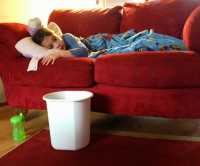Author Interviews, CDC, Gastrointestinal Disease, Infections, Vaccine Studies / 15.11.2018
CDC Identifies Most Serious Norovirus Strains
MedicalResearch.com Interview with:
 Rachel M. Burke, PhD, MPH
Epidemiologist, Viral Gastroenteritis Branch
Centers for Disease Control and Prevention
Atlanta, GA 30329
MedicalResearch.com: What is the background for this study? What are the main findings?
Response: Noroviruses are the leading cause of vomiting and diarrhea from acute gastroenteritis (inflammation of the stomach or intestines) among people of all ages in the United States. Each year in the United States, norovirus illness is responsible for an estimated 19 to 21 million cases of acute gastroenteritis, and contributes to 56,000 to 71,000 hospitalizations and 570 to 800 deaths, mostly among children and the elderly.
CDC linked information from two different surveillance systems to analyze 3,747 norovirus outbreaks reported by health departments from 2009 to 2016. Our study provides a comprehensive description of norovirus outbreaks from the epidemiology and laboratory perspectives, using the National Outbreak Reporting System (NORS) and CaliciNet, respectively.
Norovirus outbreaks caused by GII.4 strains occurred more often in healthcare settings, affected older adults, and caused more severe illness, leading to hospitalization or death.
(more…)
Rachel M. Burke, PhD, MPH
Epidemiologist, Viral Gastroenteritis Branch
Centers for Disease Control and Prevention
Atlanta, GA 30329
MedicalResearch.com: What is the background for this study? What are the main findings?
Response: Noroviruses are the leading cause of vomiting and diarrhea from acute gastroenteritis (inflammation of the stomach or intestines) among people of all ages in the United States. Each year in the United States, norovirus illness is responsible for an estimated 19 to 21 million cases of acute gastroenteritis, and contributes to 56,000 to 71,000 hospitalizations and 570 to 800 deaths, mostly among children and the elderly.
CDC linked information from two different surveillance systems to analyze 3,747 norovirus outbreaks reported by health departments from 2009 to 2016. Our study provides a comprehensive description of norovirus outbreaks from the epidemiology and laboratory perspectives, using the National Outbreak Reporting System (NORS) and CaliciNet, respectively.
Norovirus outbreaks caused by GII.4 strains occurred more often in healthcare settings, affected older adults, and caused more severe illness, leading to hospitalization or death.
(more…)
 Rachel M. Burke, PhD, MPH
Epidemiologist, Viral Gastroenteritis Branch
Centers for Disease Control and Prevention
Atlanta, GA 30329
MedicalResearch.com: What is the background for this study? What are the main findings?
Response: Noroviruses are the leading cause of vomiting and diarrhea from acute gastroenteritis (inflammation of the stomach or intestines) among people of all ages in the United States. Each year in the United States, norovirus illness is responsible for an estimated 19 to 21 million cases of acute gastroenteritis, and contributes to 56,000 to 71,000 hospitalizations and 570 to 800 deaths, mostly among children and the elderly.
CDC linked information from two different surveillance systems to analyze 3,747 norovirus outbreaks reported by health departments from 2009 to 2016. Our study provides a comprehensive description of norovirus outbreaks from the epidemiology and laboratory perspectives, using the National Outbreak Reporting System (NORS) and CaliciNet, respectively.
Norovirus outbreaks caused by GII.4 strains occurred more often in healthcare settings, affected older adults, and caused more severe illness, leading to hospitalization or death.
(more…)
Rachel M. Burke, PhD, MPH
Epidemiologist, Viral Gastroenteritis Branch
Centers for Disease Control and Prevention
Atlanta, GA 30329
MedicalResearch.com: What is the background for this study? What are the main findings?
Response: Noroviruses are the leading cause of vomiting and diarrhea from acute gastroenteritis (inflammation of the stomach or intestines) among people of all ages in the United States. Each year in the United States, norovirus illness is responsible for an estimated 19 to 21 million cases of acute gastroenteritis, and contributes to 56,000 to 71,000 hospitalizations and 570 to 800 deaths, mostly among children and the elderly.
CDC linked information from two different surveillance systems to analyze 3,747 norovirus outbreaks reported by health departments from 2009 to 2016. Our study provides a comprehensive description of norovirus outbreaks from the epidemiology and laboratory perspectives, using the National Outbreak Reporting System (NORS) and CaliciNet, respectively.
Norovirus outbreaks caused by GII.4 strains occurred more often in healthcare settings, affected older adults, and caused more severe illness, leading to hospitalization or death.
(more…)
